Comprehensive Report on Hospitality Provision in Travel and Tourism
VerifiedAdded on 2019/12/17
|16
|5263
|264
Report
AI Summary
This report examines the hospitality industry's role in the travel and tourism sector, detailing the interrelationship between the two. It explores the responsibilities of hospitality professionals, including research, awareness, and building customer relationships. The report analyzes the implications of integration on the hospitality industry, discussing the positive impacts such as exposure to wider cultures, larger markets, technological advancements, and employment generation. Furthermore, it discusses how integration affects a hospitality business, providing competitive advantages. The report also includes a rationale for a chosen project, justifying decisions related to the target market, and outlines a plan for a hospitality business, covering operational requirements. The report concludes with recommendations for a hotel chain to join a leading portfolio. The report provides a comprehensive overview of the hospitality industry's key aspects and strategic considerations.
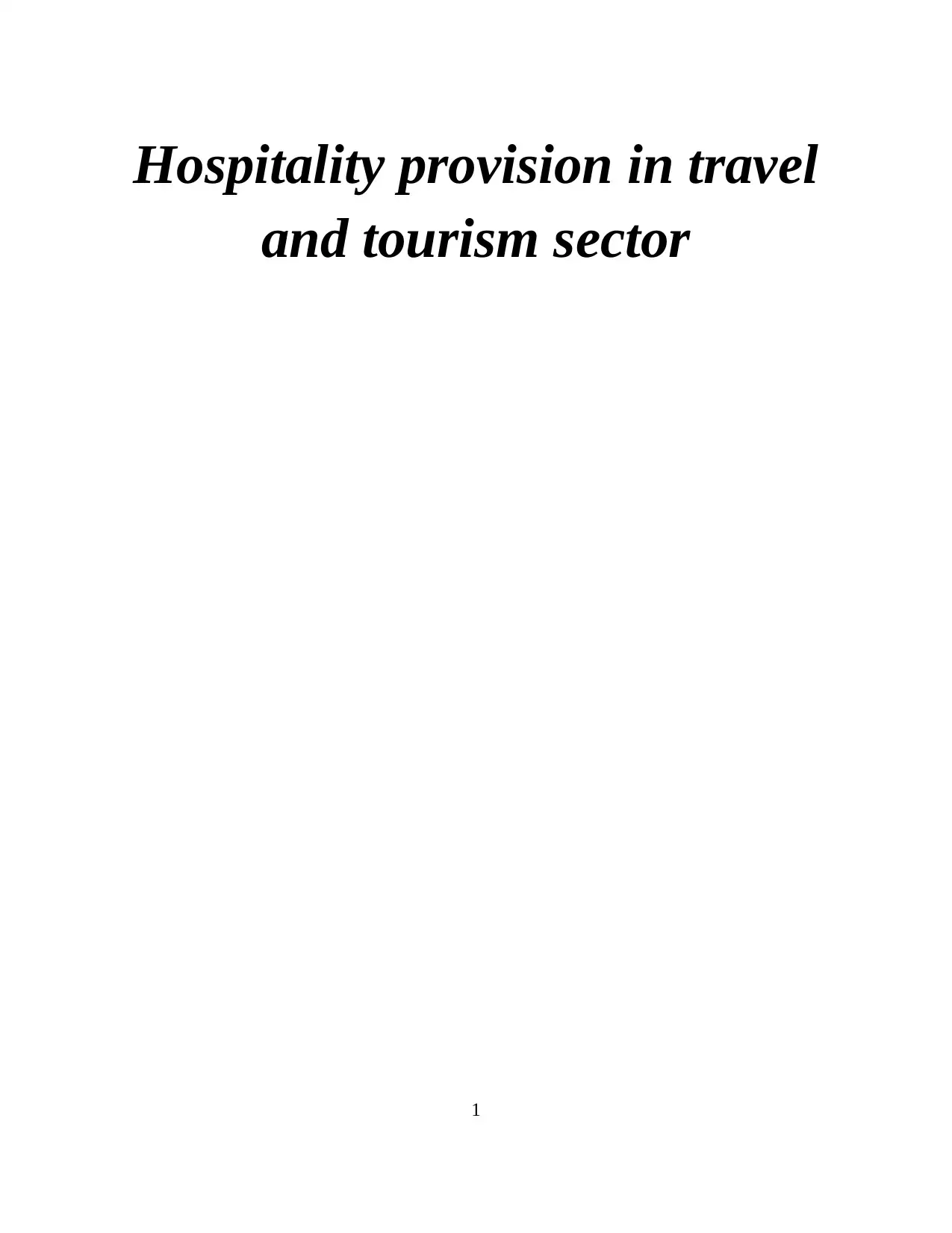
Hospitality provision in travel
and tourism sector
1
and tourism sector
1
Paraphrase This Document
Need a fresh take? Get an instant paraphrase of this document with our AI Paraphraser
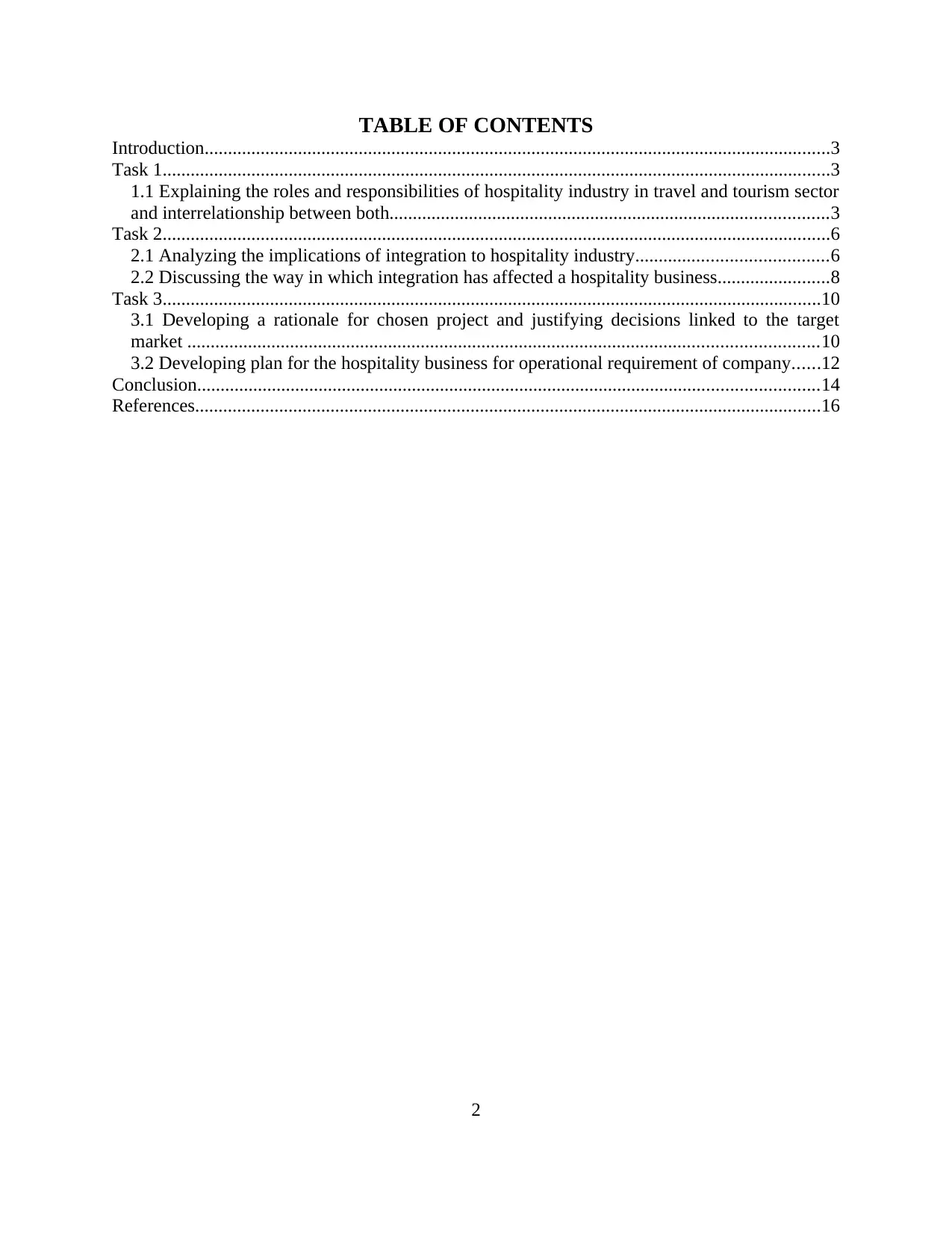
TABLE OF CONTENTS
Introduction......................................................................................................................................3
Task 1...............................................................................................................................................3
1.1 Explaining the roles and responsibilities of hospitality industry in travel and tourism sector
and interrelationship between both..............................................................................................3
Task 2...............................................................................................................................................6
2.1 Analyzing the implications of integration to hospitality industry.........................................6
2.2 Discussing the way in which integration has affected a hospitality business........................8
Task 3.............................................................................................................................................10
3.1 Developing a rationale for chosen project and justifying decisions linked to the target
market .......................................................................................................................................10
3.2 Developing plan for the hospitality business for operational requirement of company......12
Conclusion.....................................................................................................................................14
References......................................................................................................................................16
2
Introduction......................................................................................................................................3
Task 1...............................................................................................................................................3
1.1 Explaining the roles and responsibilities of hospitality industry in travel and tourism sector
and interrelationship between both..............................................................................................3
Task 2...............................................................................................................................................6
2.1 Analyzing the implications of integration to hospitality industry.........................................6
2.2 Discussing the way in which integration has affected a hospitality business........................8
Task 3.............................................................................................................................................10
3.1 Developing a rationale for chosen project and justifying decisions linked to the target
market .......................................................................................................................................10
3.2 Developing plan for the hospitality business for operational requirement of company......12
Conclusion.....................................................................................................................................14
References......................................................................................................................................16
2
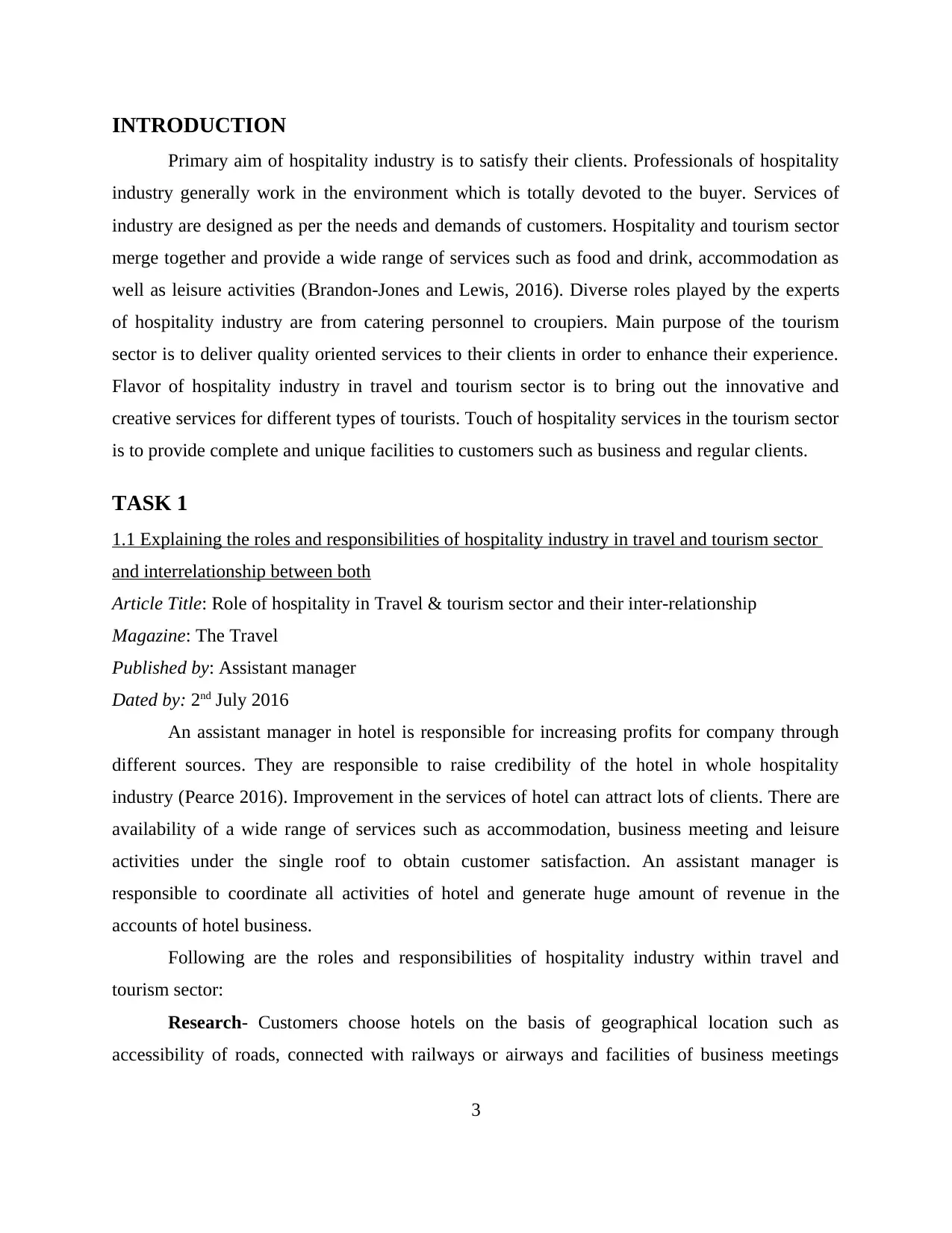
INTRODUCTION
Primary aim of hospitality industry is to satisfy their clients. Professionals of hospitality
industry generally work in the environment which is totally devoted to the buyer. Services of
industry are designed as per the needs and demands of customers. Hospitality and tourism sector
merge together and provide a wide range of services such as food and drink, accommodation as
well as leisure activities (Brandon-Jones and Lewis, 2016). Diverse roles played by the experts
of hospitality industry are from catering personnel to croupiers. Main purpose of the tourism
sector is to deliver quality oriented services to their clients in order to enhance their experience.
Flavor of hospitality industry in travel and tourism sector is to bring out the innovative and
creative services for different types of tourists. Touch of hospitality services in the tourism sector
is to provide complete and unique facilities to customers such as business and regular clients.
TASK 1
1.1 Explaining the roles and responsibilities of hospitality industry in travel and tourism sector
and interrelationship between both
Article Title: Role of hospitality in Travel & tourism sector and their inter-relationship
Magazine: The Travel
Published by: Assistant manager
Dated by: 2nd July 2016
An assistant manager in hotel is responsible for increasing profits for company through
different sources. They are responsible to raise credibility of the hotel in whole hospitality
industry (Pearce 2016). Improvement in the services of hotel can attract lots of clients. There are
availability of a wide range of services such as accommodation, business meeting and leisure
activities under the single roof to obtain customer satisfaction. An assistant manager is
responsible to coordinate all activities of hotel and generate huge amount of revenue in the
accounts of hotel business.
Following are the roles and responsibilities of hospitality industry within travel and
tourism sector:
Research- Customers choose hotels on the basis of geographical location such as
accessibility of roads, connected with railways or airways and facilities of business meetings
3
Primary aim of hospitality industry is to satisfy their clients. Professionals of hospitality
industry generally work in the environment which is totally devoted to the buyer. Services of
industry are designed as per the needs and demands of customers. Hospitality and tourism sector
merge together and provide a wide range of services such as food and drink, accommodation as
well as leisure activities (Brandon-Jones and Lewis, 2016). Diverse roles played by the experts
of hospitality industry are from catering personnel to croupiers. Main purpose of the tourism
sector is to deliver quality oriented services to their clients in order to enhance their experience.
Flavor of hospitality industry in travel and tourism sector is to bring out the innovative and
creative services for different types of tourists. Touch of hospitality services in the tourism sector
is to provide complete and unique facilities to customers such as business and regular clients.
TASK 1
1.1 Explaining the roles and responsibilities of hospitality industry in travel and tourism sector
and interrelationship between both
Article Title: Role of hospitality in Travel & tourism sector and their inter-relationship
Magazine: The Travel
Published by: Assistant manager
Dated by: 2nd July 2016
An assistant manager in hotel is responsible for increasing profits for company through
different sources. They are responsible to raise credibility of the hotel in whole hospitality
industry (Pearce 2016). Improvement in the services of hotel can attract lots of clients. There are
availability of a wide range of services such as accommodation, business meeting and leisure
activities under the single roof to obtain customer satisfaction. An assistant manager is
responsible to coordinate all activities of hotel and generate huge amount of revenue in the
accounts of hotel business.
Following are the roles and responsibilities of hospitality industry within travel and
tourism sector:
Research- Customers choose hotels on the basis of geographical location such as
accessibility of roads, connected with railways or airways and facilities of business meetings
3
⊘ This is a preview!⊘
Do you want full access?
Subscribe today to unlock all pages.

Trusted by 1+ million students worldwide
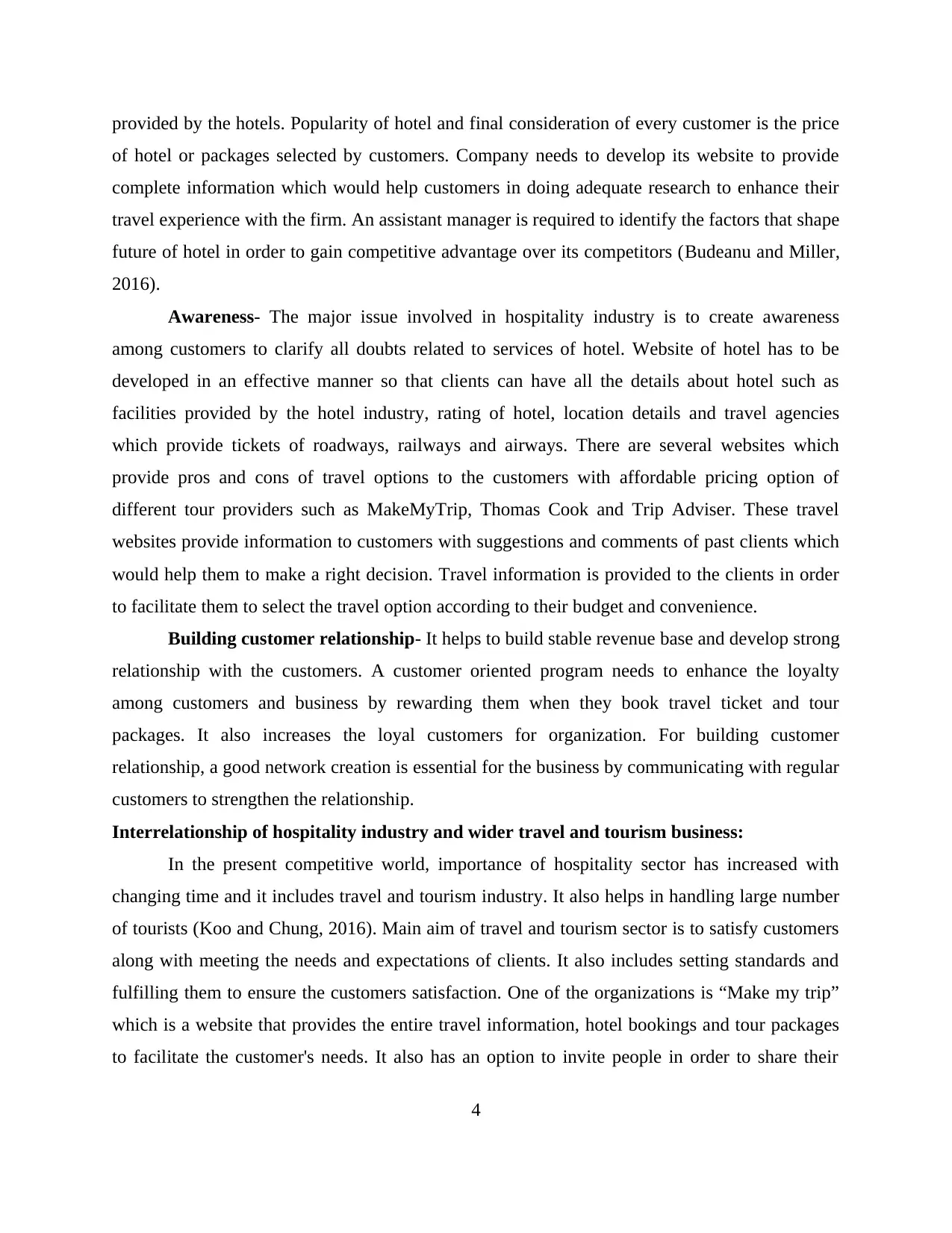
provided by the hotels. Popularity of hotel and final consideration of every customer is the price
of hotel or packages selected by customers. Company needs to develop its website to provide
complete information which would help customers in doing adequate research to enhance their
travel experience with the firm. An assistant manager is required to identify the factors that shape
future of hotel in order to gain competitive advantage over its competitors (Budeanu and Miller,
2016).
Awareness- The major issue involved in hospitality industry is to create awareness
among customers to clarify all doubts related to services of hotel. Website of hotel has to be
developed in an effective manner so that clients can have all the details about hotel such as
facilities provided by the hotel industry, rating of hotel, location details and travel agencies
which provide tickets of roadways, railways and airways. There are several websites which
provide pros and cons of travel options to the customers with affordable pricing option of
different tour providers such as MakeMyTrip, Thomas Cook and Trip Adviser. These travel
websites provide information to customers with suggestions and comments of past clients which
would help them to make a right decision. Travel information is provided to the clients in order
to facilitate them to select the travel option according to their budget and convenience.
Building customer relationship- It helps to build stable revenue base and develop strong
relationship with the customers. A customer oriented program needs to enhance the loyalty
among customers and business by rewarding them when they book travel ticket and tour
packages. It also increases the loyal customers for organization. For building customer
relationship, a good network creation is essential for the business by communicating with regular
customers to strengthen the relationship.
Interrelationship of hospitality industry and wider travel and tourism business:
In the present competitive world, importance of hospitality sector has increased with
changing time and it includes travel and tourism industry. It also helps in handling large number
of tourists (Koo and Chung, 2016). Main aim of travel and tourism sector is to satisfy customers
along with meeting the needs and expectations of clients. It also includes setting standards and
fulfilling them to ensure the customers satisfaction. One of the organizations is “Make my trip”
which is a website that provides the entire travel information, hotel bookings and tour packages
to facilitate the customer's needs. It also has an option to invite people in order to share their
4
of hotel or packages selected by customers. Company needs to develop its website to provide
complete information which would help customers in doing adequate research to enhance their
travel experience with the firm. An assistant manager is required to identify the factors that shape
future of hotel in order to gain competitive advantage over its competitors (Budeanu and Miller,
2016).
Awareness- The major issue involved in hospitality industry is to create awareness
among customers to clarify all doubts related to services of hotel. Website of hotel has to be
developed in an effective manner so that clients can have all the details about hotel such as
facilities provided by the hotel industry, rating of hotel, location details and travel agencies
which provide tickets of roadways, railways and airways. There are several websites which
provide pros and cons of travel options to the customers with affordable pricing option of
different tour providers such as MakeMyTrip, Thomas Cook and Trip Adviser. These travel
websites provide information to customers with suggestions and comments of past clients which
would help them to make a right decision. Travel information is provided to the clients in order
to facilitate them to select the travel option according to their budget and convenience.
Building customer relationship- It helps to build stable revenue base and develop strong
relationship with the customers. A customer oriented program needs to enhance the loyalty
among customers and business by rewarding them when they book travel ticket and tour
packages. It also increases the loyal customers for organization. For building customer
relationship, a good network creation is essential for the business by communicating with regular
customers to strengthen the relationship.
Interrelationship of hospitality industry and wider travel and tourism business:
In the present competitive world, importance of hospitality sector has increased with
changing time and it includes travel and tourism industry. It also helps in handling large number
of tourists (Koo and Chung, 2016). Main aim of travel and tourism sector is to satisfy customers
along with meeting the needs and expectations of clients. It also includes setting standards and
fulfilling them to ensure the customers satisfaction. One of the organizations is “Make my trip”
which is a website that provides the entire travel information, hotel bookings and tour packages
to facilitate the customer's needs. It also has an option to invite people in order to share their
4
Paraphrase This Document
Need a fresh take? Get an instant paraphrase of this document with our AI Paraphraser
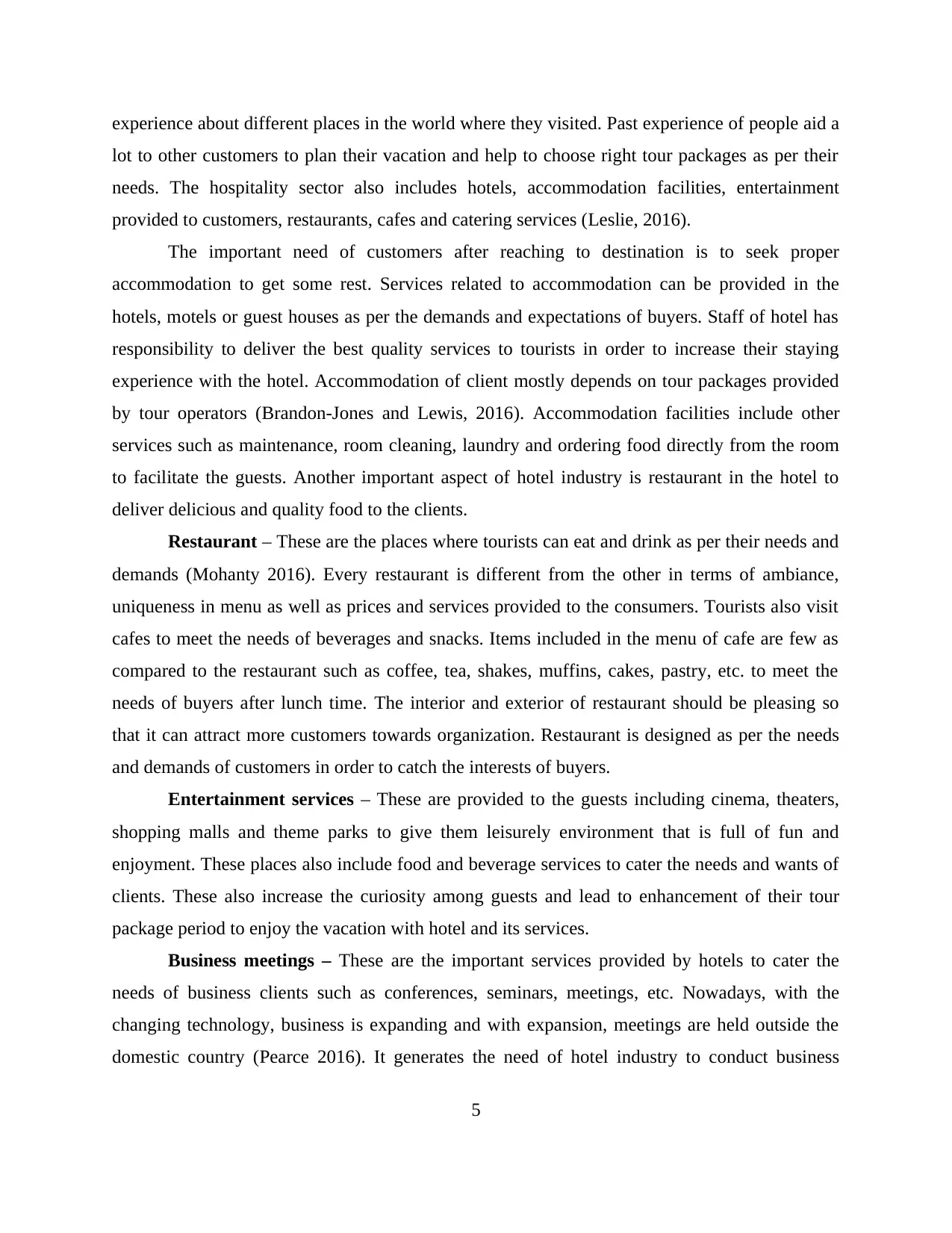
experience about different places in the world where they visited. Past experience of people aid a
lot to other customers to plan their vacation and help to choose right tour packages as per their
needs. The hospitality sector also includes hotels, accommodation facilities, entertainment
provided to customers, restaurants, cafes and catering services (Leslie, 2016).
The important need of customers after reaching to destination is to seek proper
accommodation to get some rest. Services related to accommodation can be provided in the
hotels, motels or guest houses as per the demands and expectations of buyers. Staff of hotel has
responsibility to deliver the best quality services to tourists in order to increase their staying
experience with the hotel. Accommodation of client mostly depends on tour packages provided
by tour operators (Brandon-Jones and Lewis, 2016). Accommodation facilities include other
services such as maintenance, room cleaning, laundry and ordering food directly from the room
to facilitate the guests. Another important aspect of hotel industry is restaurant in the hotel to
deliver delicious and quality food to the clients.
Restaurant – These are the places where tourists can eat and drink as per their needs and
demands (Mohanty 2016). Every restaurant is different from the other in terms of ambiance,
uniqueness in menu as well as prices and services provided to the consumers. Tourists also visit
cafes to meet the needs of beverages and snacks. Items included in the menu of cafe are few as
compared to the restaurant such as coffee, tea, shakes, muffins, cakes, pastry, etc. to meet the
needs of buyers after lunch time. The interior and exterior of restaurant should be pleasing so
that it can attract more customers towards organization. Restaurant is designed as per the needs
and demands of customers in order to catch the interests of buyers.
Entertainment services – These are provided to the guests including cinema, theaters,
shopping malls and theme parks to give them leisurely environment that is full of fun and
enjoyment. These places also include food and beverage services to cater the needs and wants of
clients. These also increase the curiosity among guests and lead to enhancement of their tour
package period to enjoy the vacation with hotel and its services.
Business meetings – These are the important services provided by hotels to cater the
needs of business clients such as conferences, seminars, meetings, etc. Nowadays, with the
changing technology, business is expanding and with expansion, meetings are held outside the
domestic country (Pearce 2016). It generates the need of hotel industry to conduct business
5
lot to other customers to plan their vacation and help to choose right tour packages as per their
needs. The hospitality sector also includes hotels, accommodation facilities, entertainment
provided to customers, restaurants, cafes and catering services (Leslie, 2016).
The important need of customers after reaching to destination is to seek proper
accommodation to get some rest. Services related to accommodation can be provided in the
hotels, motels or guest houses as per the demands and expectations of buyers. Staff of hotel has
responsibility to deliver the best quality services to tourists in order to increase their staying
experience with the hotel. Accommodation of client mostly depends on tour packages provided
by tour operators (Brandon-Jones and Lewis, 2016). Accommodation facilities include other
services such as maintenance, room cleaning, laundry and ordering food directly from the room
to facilitate the guests. Another important aspect of hotel industry is restaurant in the hotel to
deliver delicious and quality food to the clients.
Restaurant – These are the places where tourists can eat and drink as per their needs and
demands (Mohanty 2016). Every restaurant is different from the other in terms of ambiance,
uniqueness in menu as well as prices and services provided to the consumers. Tourists also visit
cafes to meet the needs of beverages and snacks. Items included in the menu of cafe are few as
compared to the restaurant such as coffee, tea, shakes, muffins, cakes, pastry, etc. to meet the
needs of buyers after lunch time. The interior and exterior of restaurant should be pleasing so
that it can attract more customers towards organization. Restaurant is designed as per the needs
and demands of customers in order to catch the interests of buyers.
Entertainment services – These are provided to the guests including cinema, theaters,
shopping malls and theme parks to give them leisurely environment that is full of fun and
enjoyment. These places also include food and beverage services to cater the needs and wants of
clients. These also increase the curiosity among guests and lead to enhancement of their tour
package period to enjoy the vacation with hotel and its services.
Business meetings – These are the important services provided by hotels to cater the
needs of business clients such as conferences, seminars, meetings, etc. Nowadays, with the
changing technology, business is expanding and with expansion, meetings are held outside the
domestic country (Pearce 2016). It generates the need of hotel industry to conduct business
5
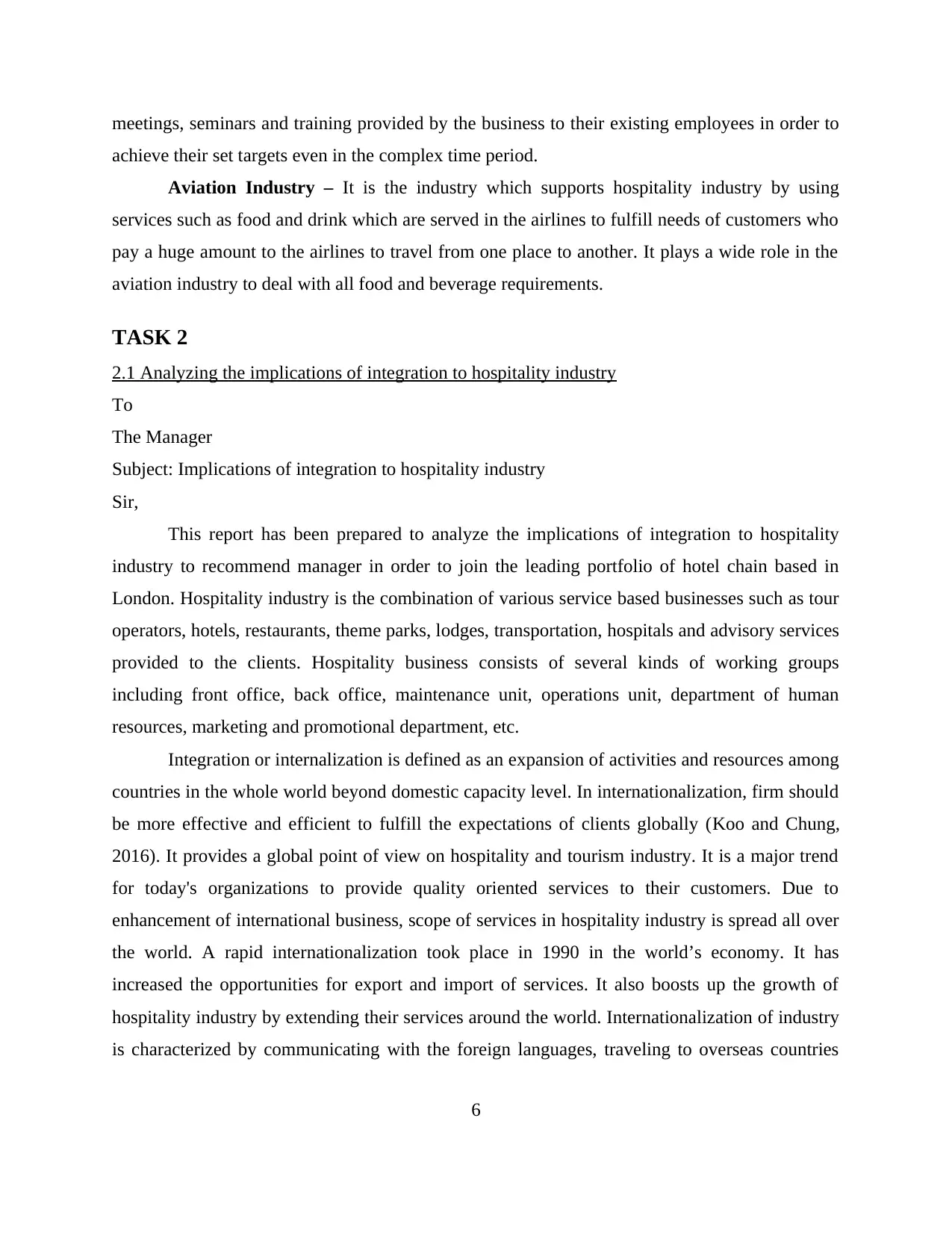
meetings, seminars and training provided by the business to their existing employees in order to
achieve their set targets even in the complex time period.
Aviation Industry – It is the industry which supports hospitality industry by using
services such as food and drink which are served in the airlines to fulfill needs of customers who
pay a huge amount to the airlines to travel from one place to another. It plays a wide role in the
aviation industry to deal with all food and beverage requirements.
TASK 2
2.1 Analyzing the implications of integration to hospitality industry
To
The Manager
Subject: Implications of integration to hospitality industry
Sir,
This report has been prepared to analyze the implications of integration to hospitality
industry to recommend manager in order to join the leading portfolio of hotel chain based in
London. Hospitality industry is the combination of various service based businesses such as tour
operators, hotels, restaurants, theme parks, lodges, transportation, hospitals and advisory services
provided to the clients. Hospitality business consists of several kinds of working groups
including front office, back office, maintenance unit, operations unit, department of human
resources, marketing and promotional department, etc.
Integration or internalization is defined as an expansion of activities and resources among
countries in the whole world beyond domestic capacity level. In internationalization, firm should
be more effective and efficient to fulfill the expectations of clients globally (Koo and Chung,
2016). It provides a global point of view on hospitality and tourism industry. It is a major trend
for today's organizations to provide quality oriented services to their customers. Due to
enhancement of international business, scope of services in hospitality industry is spread all over
the world. A rapid internationalization took place in 1990 in the world’s economy. It has
increased the opportunities for export and import of services. It also boosts up the growth of
hospitality industry by extending their services around the world. Internationalization of industry
is characterized by communicating with the foreign languages, traveling to overseas countries
6
achieve their set targets even in the complex time period.
Aviation Industry – It is the industry which supports hospitality industry by using
services such as food and drink which are served in the airlines to fulfill needs of customers who
pay a huge amount to the airlines to travel from one place to another. It plays a wide role in the
aviation industry to deal with all food and beverage requirements.
TASK 2
2.1 Analyzing the implications of integration to hospitality industry
To
The Manager
Subject: Implications of integration to hospitality industry
Sir,
This report has been prepared to analyze the implications of integration to hospitality
industry to recommend manager in order to join the leading portfolio of hotel chain based in
London. Hospitality industry is the combination of various service based businesses such as tour
operators, hotels, restaurants, theme parks, lodges, transportation, hospitals and advisory services
provided to the clients. Hospitality business consists of several kinds of working groups
including front office, back office, maintenance unit, operations unit, department of human
resources, marketing and promotional department, etc.
Integration or internalization is defined as an expansion of activities and resources among
countries in the whole world beyond domestic capacity level. In internationalization, firm should
be more effective and efficient to fulfill the expectations of clients globally (Koo and Chung,
2016). It provides a global point of view on hospitality and tourism industry. It is a major trend
for today's organizations to provide quality oriented services to their customers. Due to
enhancement of international business, scope of services in hospitality industry is spread all over
the world. A rapid internationalization took place in 1990 in the world’s economy. It has
increased the opportunities for export and import of services. It also boosts up the growth of
hospitality industry by extending their services around the world. Internationalization of industry
is characterized by communicating with the foreign languages, traveling to overseas countries
6
⊘ This is a preview!⊘
Do you want full access?
Subscribe today to unlock all pages.

Trusted by 1+ million students worldwide
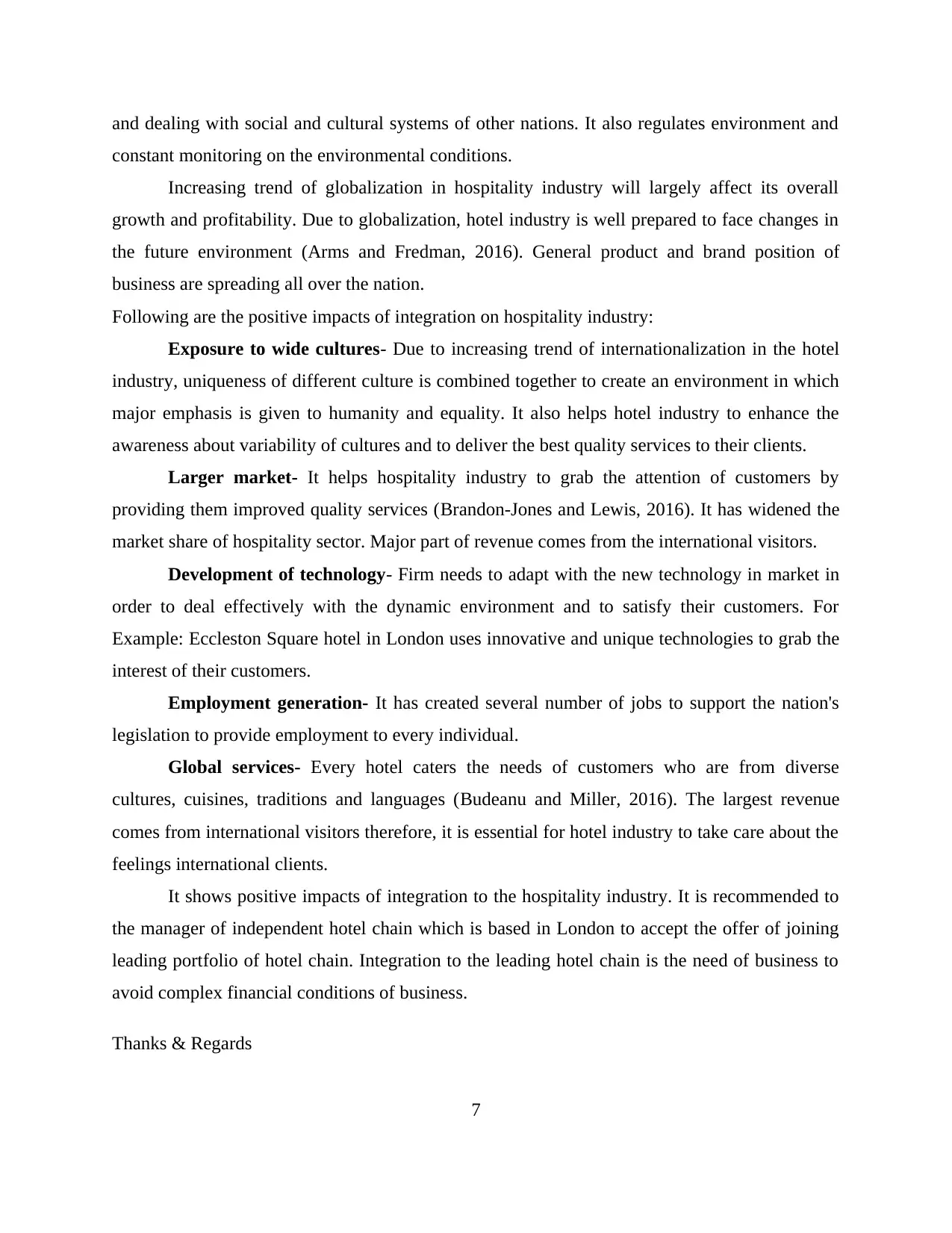
and dealing with social and cultural systems of other nations. It also regulates environment and
constant monitoring on the environmental conditions.
Increasing trend of globalization in hospitality industry will largely affect its overall
growth and profitability. Due to globalization, hotel industry is well prepared to face changes in
the future environment (Arms and Fredman, 2016). General product and brand position of
business are spreading all over the nation.
Following are the positive impacts of integration on hospitality industry:
Exposure to wide cultures- Due to increasing trend of internationalization in the hotel
industry, uniqueness of different culture is combined together to create an environment in which
major emphasis is given to humanity and equality. It also helps hotel industry to enhance the
awareness about variability of cultures and to deliver the best quality services to their clients.
Larger market- It helps hospitality industry to grab the attention of customers by
providing them improved quality services (Brandon-Jones and Lewis, 2016). It has widened the
market share of hospitality sector. Major part of revenue comes from the international visitors.
Development of technology- Firm needs to adapt with the new technology in market in
order to deal effectively with the dynamic environment and to satisfy their customers. For
Example: Eccleston Square hotel in London uses innovative and unique technologies to grab the
interest of their customers.
Employment generation- It has created several number of jobs to support the nation's
legislation to provide employment to every individual.
Global services- Every hotel caters the needs of customers who are from diverse
cultures, cuisines, traditions and languages (Budeanu and Miller, 2016). The largest revenue
comes from international visitors therefore, it is essential for hotel industry to take care about the
feelings international clients.
It shows positive impacts of integration to the hospitality industry. It is recommended to
the manager of independent hotel chain which is based in London to accept the offer of joining
leading portfolio of hotel chain. Integration to the leading hotel chain is the need of business to
avoid complex financial conditions of business.
Thanks & Regards
7
constant monitoring on the environmental conditions.
Increasing trend of globalization in hospitality industry will largely affect its overall
growth and profitability. Due to globalization, hotel industry is well prepared to face changes in
the future environment (Arms and Fredman, 2016). General product and brand position of
business are spreading all over the nation.
Following are the positive impacts of integration on hospitality industry:
Exposure to wide cultures- Due to increasing trend of internationalization in the hotel
industry, uniqueness of different culture is combined together to create an environment in which
major emphasis is given to humanity and equality. It also helps hotel industry to enhance the
awareness about variability of cultures and to deliver the best quality services to their clients.
Larger market- It helps hospitality industry to grab the attention of customers by
providing them improved quality services (Brandon-Jones and Lewis, 2016). It has widened the
market share of hospitality sector. Major part of revenue comes from the international visitors.
Development of technology- Firm needs to adapt with the new technology in market in
order to deal effectively with the dynamic environment and to satisfy their customers. For
Example: Eccleston Square hotel in London uses innovative and unique technologies to grab the
interest of their customers.
Employment generation- It has created several number of jobs to support the nation's
legislation to provide employment to every individual.
Global services- Every hotel caters the needs of customers who are from diverse
cultures, cuisines, traditions and languages (Budeanu and Miller, 2016). The largest revenue
comes from international visitors therefore, it is essential for hotel industry to take care about the
feelings international clients.
It shows positive impacts of integration to the hospitality industry. It is recommended to
the manager of independent hotel chain which is based in London to accept the offer of joining
leading portfolio of hotel chain. Integration to the leading hotel chain is the need of business to
avoid complex financial conditions of business.
Thanks & Regards
7
Paraphrase This Document
Need a fresh take? Get an instant paraphrase of this document with our AI Paraphraser
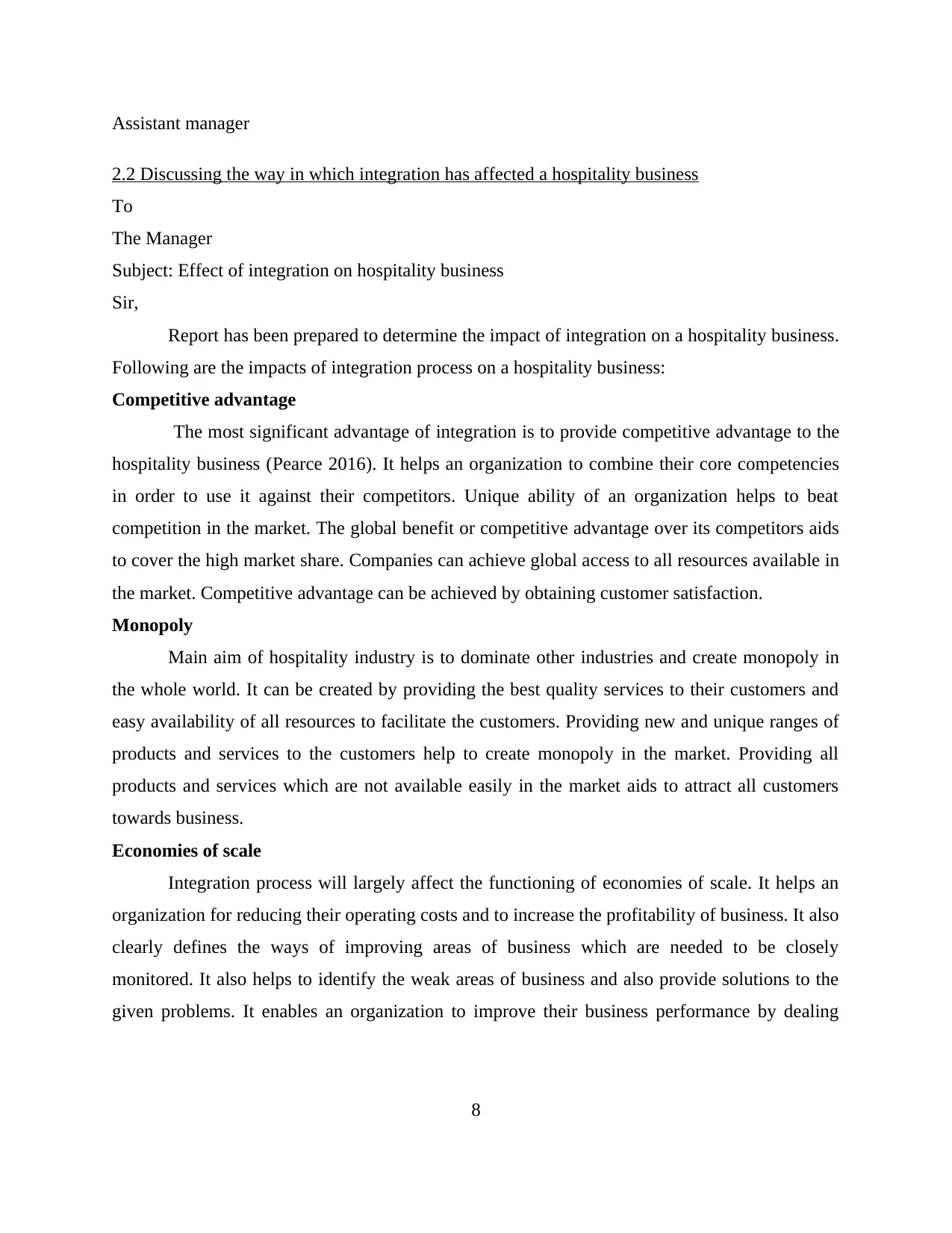
Assistant manager
2.2 Discussing the way in which integration has affected a hospitality business
To
The Manager
Subject: Effect of integration on hospitality business
Sir,
Report has been prepared to determine the impact of integration on a hospitality business.
Following are the impacts of integration process on a hospitality business:
Competitive advantage
The most significant advantage of integration is to provide competitive advantage to the
hospitality business (Pearce 2016). It helps an organization to combine their core competencies
in order to use it against their competitors. Unique ability of an organization helps to beat
competition in the market. The global benefit or competitive advantage over its competitors aids
to cover the high market share. Companies can achieve global access to all resources available in
the market. Competitive advantage can be achieved by obtaining customer satisfaction.
Monopoly
Main aim of hospitality industry is to dominate other industries and create monopoly in
the whole world. It can be created by providing the best quality services to their customers and
easy availability of all resources to facilitate the customers. Providing new and unique ranges of
products and services to the customers help to create monopoly in the market. Providing all
products and services which are not available easily in the market aids to attract all customers
towards business.
Economies of scale
Integration process will largely affect the functioning of economies of scale. It helps an
organization for reducing their operating costs and to increase the profitability of business. It also
clearly defines the ways of improving areas of business which are needed to be closely
monitored. It also helps to identify the weak areas of business and also provide solutions to the
given problems. It enables an organization to improve their business performance by dealing
8
2.2 Discussing the way in which integration has affected a hospitality business
To
The Manager
Subject: Effect of integration on hospitality business
Sir,
Report has been prepared to determine the impact of integration on a hospitality business.
Following are the impacts of integration process on a hospitality business:
Competitive advantage
The most significant advantage of integration is to provide competitive advantage to the
hospitality business (Pearce 2016). It helps an organization to combine their core competencies
in order to use it against their competitors. Unique ability of an organization helps to beat
competition in the market. The global benefit or competitive advantage over its competitors aids
to cover the high market share. Companies can achieve global access to all resources available in
the market. Competitive advantage can be achieved by obtaining customer satisfaction.
Monopoly
Main aim of hospitality industry is to dominate other industries and create monopoly in
the whole world. It can be created by providing the best quality services to their customers and
easy availability of all resources to facilitate the customers. Providing new and unique ranges of
products and services to the customers help to create monopoly in the market. Providing all
products and services which are not available easily in the market aids to attract all customers
towards business.
Economies of scale
Integration process will largely affect the functioning of economies of scale. It helps an
organization for reducing their operating costs and to increase the profitability of business. It also
clearly defines the ways of improving areas of business which are needed to be closely
monitored. It also helps to identify the weak areas of business and also provide solutions to the
given problems. It enables an organization to improve their business performance by dealing
8
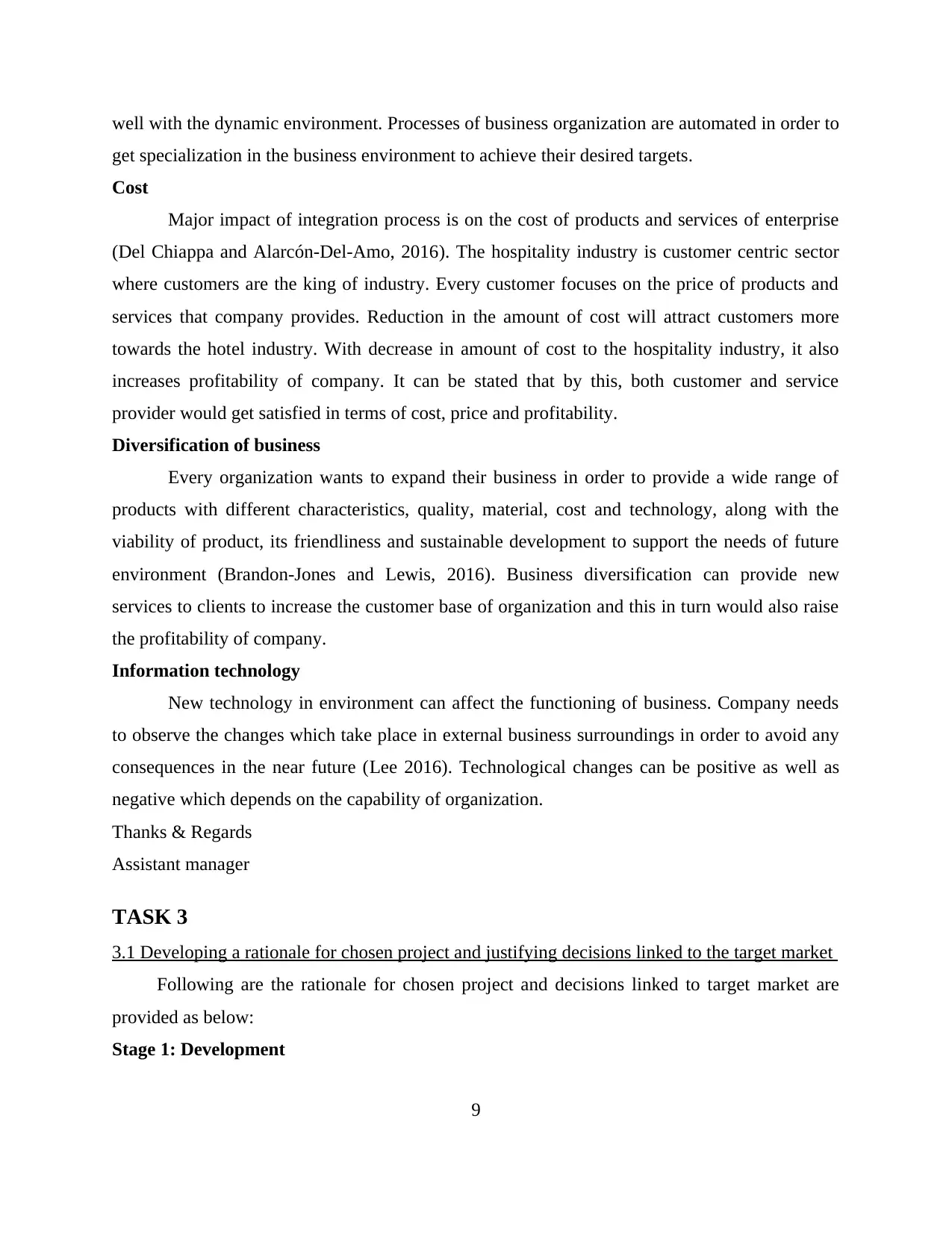
well with the dynamic environment. Processes of business organization are automated in order to
get specialization in the business environment to achieve their desired targets.
Cost
Major impact of integration process is on the cost of products and services of enterprise
(Del Chiappa and Alarcón-Del-Amo, 2016). The hospitality industry is customer centric sector
where customers are the king of industry. Every customer focuses on the price of products and
services that company provides. Reduction in the amount of cost will attract customers more
towards the hotel industry. With decrease in amount of cost to the hospitality industry, it also
increases profitability of company. It can be stated that by this, both customer and service
provider would get satisfied in terms of cost, price and profitability.
Diversification of business
Every organization wants to expand their business in order to provide a wide range of
products with different characteristics, quality, material, cost and technology, along with the
viability of product, its friendliness and sustainable development to support the needs of future
environment (Brandon-Jones and Lewis, 2016). Business diversification can provide new
services to clients to increase the customer base of organization and this in turn would also raise
the profitability of company.
Information technology
New technology in environment can affect the functioning of business. Company needs
to observe the changes which take place in external business surroundings in order to avoid any
consequences in the near future (Lee 2016). Technological changes can be positive as well as
negative which depends on the capability of organization.
Thanks & Regards
Assistant manager
TASK 3
3.1 Developing a rationale for chosen project and justifying decisions linked to the target market
Following are the rationale for chosen project and decisions linked to target market are
provided as below:
Stage 1: Development
9
get specialization in the business environment to achieve their desired targets.
Cost
Major impact of integration process is on the cost of products and services of enterprise
(Del Chiappa and Alarcón-Del-Amo, 2016). The hospitality industry is customer centric sector
where customers are the king of industry. Every customer focuses on the price of products and
services that company provides. Reduction in the amount of cost will attract customers more
towards the hotel industry. With decrease in amount of cost to the hospitality industry, it also
increases profitability of company. It can be stated that by this, both customer and service
provider would get satisfied in terms of cost, price and profitability.
Diversification of business
Every organization wants to expand their business in order to provide a wide range of
products with different characteristics, quality, material, cost and technology, along with the
viability of product, its friendliness and sustainable development to support the needs of future
environment (Brandon-Jones and Lewis, 2016). Business diversification can provide new
services to clients to increase the customer base of organization and this in turn would also raise
the profitability of company.
Information technology
New technology in environment can affect the functioning of business. Company needs
to observe the changes which take place in external business surroundings in order to avoid any
consequences in the near future (Lee 2016). Technological changes can be positive as well as
negative which depends on the capability of organization.
Thanks & Regards
Assistant manager
TASK 3
3.1 Developing a rationale for chosen project and justifying decisions linked to the target market
Following are the rationale for chosen project and decisions linked to target market are
provided as below:
Stage 1: Development
9
⊘ This is a preview!⊘
Do you want full access?
Subscribe today to unlock all pages.

Trusted by 1+ million students worldwide
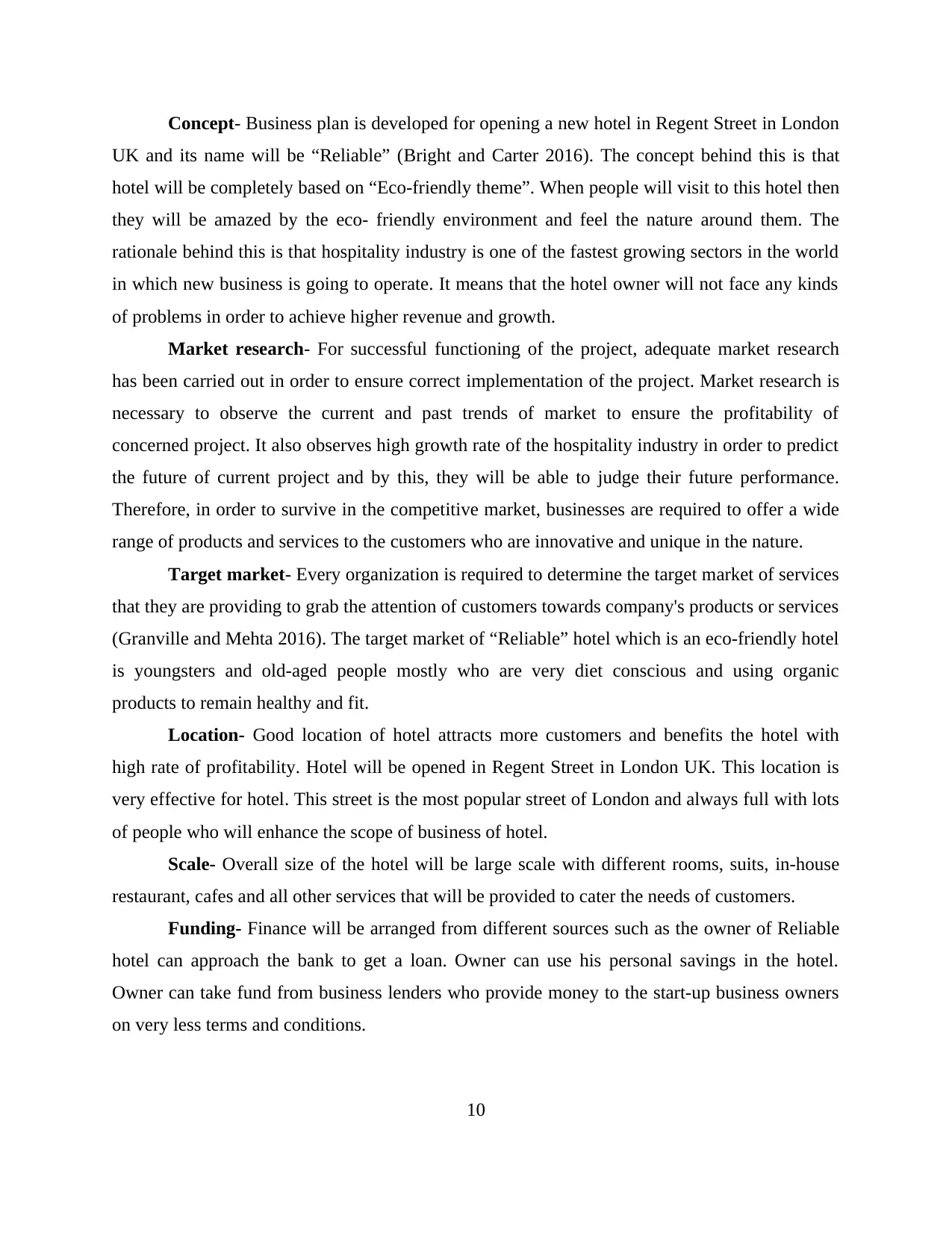
Concept- Business plan is developed for opening a new hotel in Regent Street in London
UK and its name will be “Reliable” (Bright and Carter 2016). The concept behind this is that
hotel will be completely based on “Eco-friendly theme”. When people will visit to this hotel then
they will be amazed by the eco- friendly environment and feel the nature around them. The
rationale behind this is that hospitality industry is one of the fastest growing sectors in the world
in which new business is going to operate. It means that the hotel owner will not face any kinds
of problems in order to achieve higher revenue and growth.
Market research- For successful functioning of the project, adequate market research
has been carried out in order to ensure correct implementation of the project. Market research is
necessary to observe the current and past trends of market to ensure the profitability of
concerned project. It also observes high growth rate of the hospitality industry in order to predict
the future of current project and by this, they will be able to judge their future performance.
Therefore, in order to survive in the competitive market, businesses are required to offer a wide
range of products and services to the customers who are innovative and unique in the nature.
Target market- Every organization is required to determine the target market of services
that they are providing to grab the attention of customers towards company's products or services
(Granville and Mehta 2016). The target market of “Reliable” hotel which is an eco-friendly hotel
is youngsters and old-aged people mostly who are very diet conscious and using organic
products to remain healthy and fit.
Location- Good location of hotel attracts more customers and benefits the hotel with
high rate of profitability. Hotel will be opened in Regent Street in London UK. This location is
very effective for hotel. This street is the most popular street of London and always full with lots
of people who will enhance the scope of business of hotel.
Scale- Overall size of the hotel will be large scale with different rooms, suits, in-house
restaurant, cafes and all other services that will be provided to cater the needs of customers.
Funding- Finance will be arranged from different sources such as the owner of Reliable
hotel can approach the bank to get a loan. Owner can use his personal savings in the hotel.
Owner can take fund from business lenders who provide money to the start-up business owners
on very less terms and conditions.
10
UK and its name will be “Reliable” (Bright and Carter 2016). The concept behind this is that
hotel will be completely based on “Eco-friendly theme”. When people will visit to this hotel then
they will be amazed by the eco- friendly environment and feel the nature around them. The
rationale behind this is that hospitality industry is one of the fastest growing sectors in the world
in which new business is going to operate. It means that the hotel owner will not face any kinds
of problems in order to achieve higher revenue and growth.
Market research- For successful functioning of the project, adequate market research
has been carried out in order to ensure correct implementation of the project. Market research is
necessary to observe the current and past trends of market to ensure the profitability of
concerned project. It also observes high growth rate of the hospitality industry in order to predict
the future of current project and by this, they will be able to judge their future performance.
Therefore, in order to survive in the competitive market, businesses are required to offer a wide
range of products and services to the customers who are innovative and unique in the nature.
Target market- Every organization is required to determine the target market of services
that they are providing to grab the attention of customers towards company's products or services
(Granville and Mehta 2016). The target market of “Reliable” hotel which is an eco-friendly hotel
is youngsters and old-aged people mostly who are very diet conscious and using organic
products to remain healthy and fit.
Location- Good location of hotel attracts more customers and benefits the hotel with
high rate of profitability. Hotel will be opened in Regent Street in London UK. This location is
very effective for hotel. This street is the most popular street of London and always full with lots
of people who will enhance the scope of business of hotel.
Scale- Overall size of the hotel will be large scale with different rooms, suits, in-house
restaurant, cafes and all other services that will be provided to cater the needs of customers.
Funding- Finance will be arranged from different sources such as the owner of Reliable
hotel can approach the bank to get a loan. Owner can use his personal savings in the hotel.
Owner can take fund from business lenders who provide money to the start-up business owners
on very less terms and conditions.
10
Paraphrase This Document
Need a fresh take? Get an instant paraphrase of this document with our AI Paraphraser
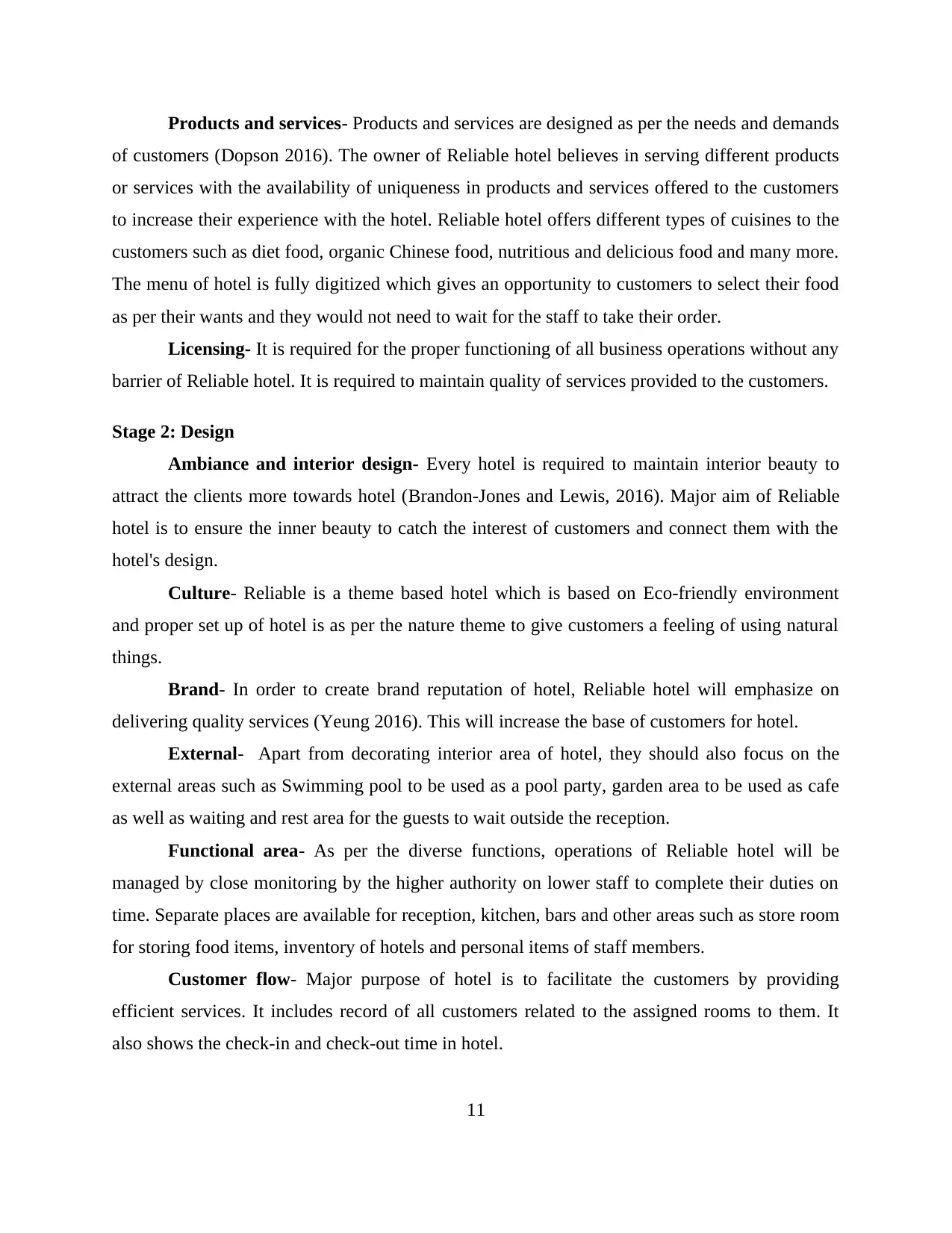
Products and services- Products and services are designed as per the needs and demands
of customers (Dopson 2016). The owner of Reliable hotel believes in serving different products
or services with the availability of uniqueness in products and services offered to the customers
to increase their experience with the hotel. Reliable hotel offers different types of cuisines to the
customers such as diet food, organic Chinese food, nutritious and delicious food and many more.
The menu of hotel is fully digitized which gives an opportunity to customers to select their food
as per their wants and they would not need to wait for the staff to take their order.
Licensing- It is required for the proper functioning of all business operations without any
barrier of Reliable hotel. It is required to maintain quality of services provided to the customers.
Stage 2: Design
Ambiance and interior design- Every hotel is required to maintain interior beauty to
attract the clients more towards hotel (Brandon-Jones and Lewis, 2016). Major aim of Reliable
hotel is to ensure the inner beauty to catch the interest of customers and connect them with the
hotel's design.
Culture- Reliable is a theme based hotel which is based on Eco-friendly environment
and proper set up of hotel is as per the nature theme to give customers a feeling of using natural
things.
Brand- In order to create brand reputation of hotel, Reliable hotel will emphasize on
delivering quality services (Yeung 2016). This will increase the base of customers for hotel.
External- Apart from decorating interior area of hotel, they should also focus on the
external areas such as Swimming pool to be used as a pool party, garden area to be used as cafe
as well as waiting and rest area for the guests to wait outside the reception.
Functional area- As per the diverse functions, operations of Reliable hotel will be
managed by close monitoring by the higher authority on lower staff to complete their duties on
time. Separate places are available for reception, kitchen, bars and other areas such as store room
for storing food items, inventory of hotels and personal items of staff members.
Customer flow- Major purpose of hotel is to facilitate the customers by providing
efficient services. It includes record of all customers related to the assigned rooms to them. It
also shows the check-in and check-out time in hotel.
11
of customers (Dopson 2016). The owner of Reliable hotel believes in serving different products
or services with the availability of uniqueness in products and services offered to the customers
to increase their experience with the hotel. Reliable hotel offers different types of cuisines to the
customers such as diet food, organic Chinese food, nutritious and delicious food and many more.
The menu of hotel is fully digitized which gives an opportunity to customers to select their food
as per their wants and they would not need to wait for the staff to take their order.
Licensing- It is required for the proper functioning of all business operations without any
barrier of Reliable hotel. It is required to maintain quality of services provided to the customers.
Stage 2: Design
Ambiance and interior design- Every hotel is required to maintain interior beauty to
attract the clients more towards hotel (Brandon-Jones and Lewis, 2016). Major aim of Reliable
hotel is to ensure the inner beauty to catch the interest of customers and connect them with the
hotel's design.
Culture- Reliable is a theme based hotel which is based on Eco-friendly environment
and proper set up of hotel is as per the nature theme to give customers a feeling of using natural
things.
Brand- In order to create brand reputation of hotel, Reliable hotel will emphasize on
delivering quality services (Yeung 2016). This will increase the base of customers for hotel.
External- Apart from decorating interior area of hotel, they should also focus on the
external areas such as Swimming pool to be used as a pool party, garden area to be used as cafe
as well as waiting and rest area for the guests to wait outside the reception.
Functional area- As per the diverse functions, operations of Reliable hotel will be
managed by close monitoring by the higher authority on lower staff to complete their duties on
time. Separate places are available for reception, kitchen, bars and other areas such as store room
for storing food items, inventory of hotels and personal items of staff members.
Customer flow- Major purpose of hotel is to facilitate the customers by providing
efficient services. It includes record of all customers related to the assigned rooms to them. It
also shows the check-in and check-out time in hotel.
11
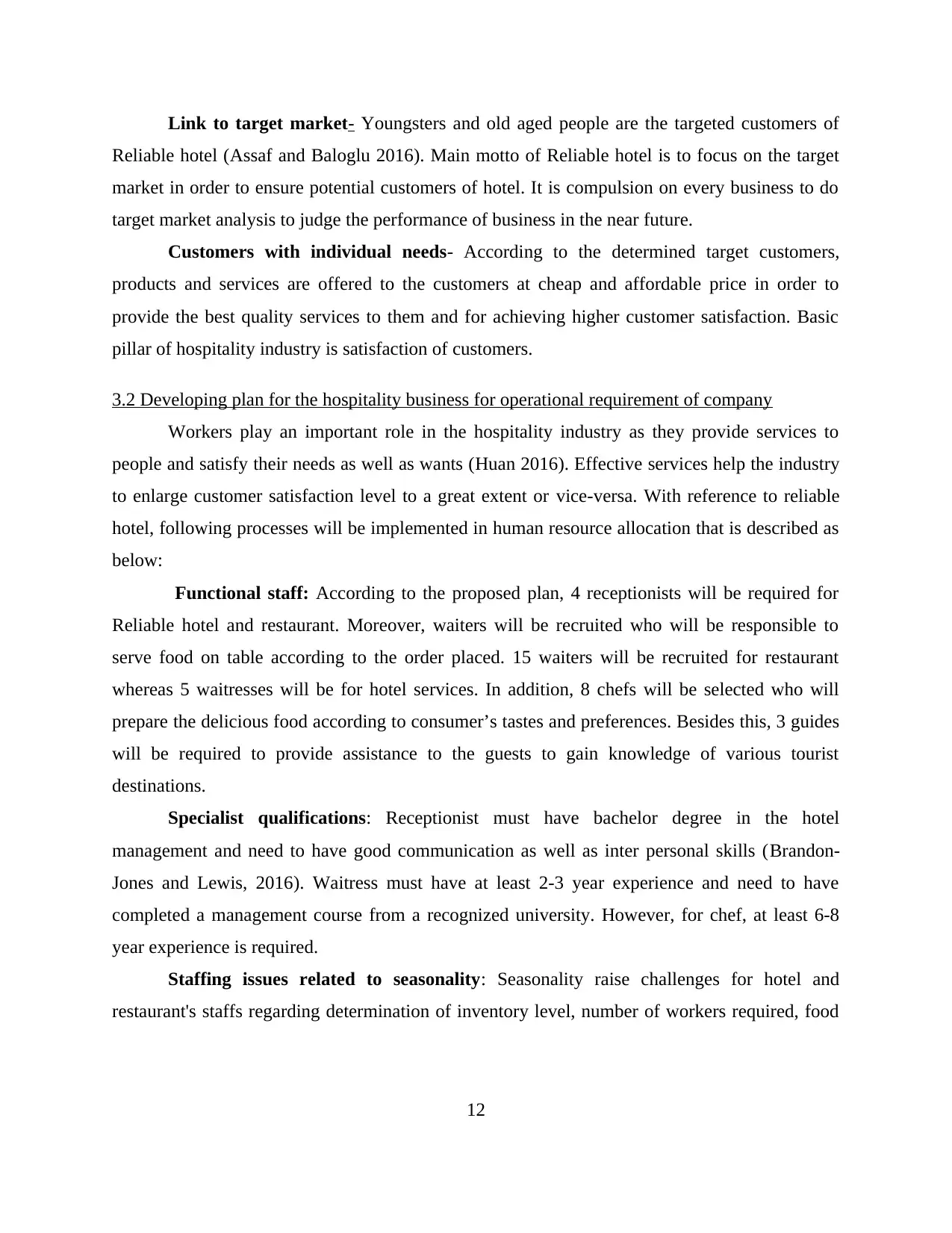
Link to target market- Youngsters and old aged people are the targeted customers of
Reliable hotel (Assaf and Baloglu 2016). Main motto of Reliable hotel is to focus on the target
market in order to ensure potential customers of hotel. It is compulsion on every business to do
target market analysis to judge the performance of business in the near future.
Customers with individual needs- According to the determined target customers,
products and services are offered to the customers at cheap and affordable price in order to
provide the best quality services to them and for achieving higher customer satisfaction. Basic
pillar of hospitality industry is satisfaction of customers.
3.2 Developing plan for the hospitality business for operational requirement of company
Workers play an important role in the hospitality industry as they provide services to
people and satisfy their needs as well as wants (Huan 2016). Effective services help the industry
to enlarge customer satisfaction level to a great extent or vice-versa. With reference to reliable
hotel, following processes will be implemented in human resource allocation that is described as
below:
Functional staff: According to the proposed plan, 4 receptionists will be required for
Reliable hotel and restaurant. Moreover, waiters will be recruited who will be responsible to
serve food on table according to the order placed. 15 waiters will be recruited for restaurant
whereas 5 waitresses will be for hotel services. In addition, 8 chefs will be selected who will
prepare the delicious food according to consumer’s tastes and preferences. Besides this, 3 guides
will be required to provide assistance to the guests to gain knowledge of various tourist
destinations.
Specialist qualifications: Receptionist must have bachelor degree in the hotel
management and need to have good communication as well as inter personal skills (Brandon-
Jones and Lewis, 2016). Waitress must have at least 2-3 year experience and need to have
completed a management course from a recognized university. However, for chef, at least 6-8
year experience is required.
Staffing issues related to seasonality: Seasonality raise challenges for hotel and
restaurant's staffs regarding determination of inventory level, number of workers required, food
12
Reliable hotel (Assaf and Baloglu 2016). Main motto of Reliable hotel is to focus on the target
market in order to ensure potential customers of hotel. It is compulsion on every business to do
target market analysis to judge the performance of business in the near future.
Customers with individual needs- According to the determined target customers,
products and services are offered to the customers at cheap and affordable price in order to
provide the best quality services to them and for achieving higher customer satisfaction. Basic
pillar of hospitality industry is satisfaction of customers.
3.2 Developing plan for the hospitality business for operational requirement of company
Workers play an important role in the hospitality industry as they provide services to
people and satisfy their needs as well as wants (Huan 2016). Effective services help the industry
to enlarge customer satisfaction level to a great extent or vice-versa. With reference to reliable
hotel, following processes will be implemented in human resource allocation that is described as
below:
Functional staff: According to the proposed plan, 4 receptionists will be required for
Reliable hotel and restaurant. Moreover, waiters will be recruited who will be responsible to
serve food on table according to the order placed. 15 waiters will be recruited for restaurant
whereas 5 waitresses will be for hotel services. In addition, 8 chefs will be selected who will
prepare the delicious food according to consumer’s tastes and preferences. Besides this, 3 guides
will be required to provide assistance to the guests to gain knowledge of various tourist
destinations.
Specialist qualifications: Receptionist must have bachelor degree in the hotel
management and need to have good communication as well as inter personal skills (Brandon-
Jones and Lewis, 2016). Waitress must have at least 2-3 year experience and need to have
completed a management course from a recognized university. However, for chef, at least 6-8
year experience is required.
Staffing issues related to seasonality: Seasonality raise challenges for hotel and
restaurant's staffs regarding determination of inventory level, number of workers required, food
12
⊘ This is a preview!⊘
Do you want full access?
Subscribe today to unlock all pages.

Trusted by 1+ million students worldwide
1 out of 16
Related Documents
Your All-in-One AI-Powered Toolkit for Academic Success.
+13062052269
info@desklib.com
Available 24*7 on WhatsApp / Email
![[object Object]](/_next/static/media/star-bottom.7253800d.svg)
Unlock your academic potential
Copyright © 2020–2026 A2Z Services. All Rights Reserved. Developed and managed by ZUCOL.





